MercoPress. South Atlantic News Agency
Uruguay
-
Thursday, February 26th 2015 - 05:26 UTC
Cristina Fernandez will complete her mandate, 'despite wanting to be kicked out'

Former Uruguayan President Jorge Batlle said that Argentine President Cristina Fernandez “wants to be kicked out of government”, replicating Argentine opposition comments.
-
Wednesday, February 25th 2015 - 03:55 UTC
“Falkland Islanders feel a strong relationship with Uruguay going back a long way”

British ambassadors in Chile, Brazil and Uruguay, Fiona Clouder, Alex W Ellis and Ben Lyster-Binns, respectively visited the Falkland Islands on a familiarization tour and to try to establish closer links with the Islands.
-
Tuesday, February 24th 2015 - 04:52 UTC
Argentina says Mujica's comments on Argentina's integration spirit are 'unfair'
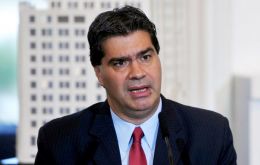
Argentina's Cabinet Chief Jorge Capitanich on Monday responded to Uruguay’s President José “Pepe” Mujica, who accused Argentina of “forgetting about integration” when things go right for the country, saying the statement was “unfair” given Argentina’s role in the “foundation” of regional integration.
-
Friday, February 20th 2015 - 00:23 UTC
Uruguay's minister Almagro presents his program for a renewed OAS

The Permanent Council of the Organization of American States (OAS) received a presentation by Uruguay's foreign minister Luis Almagro, in his capacity as candidate for Secretary General of the Organization, in a special meeting that took place at the headquarters of the OAS in Washington DC.
-
Wednesday, February 18th 2015 - 23:06 UTC
OAS Secretary General hopeful meets with Insulza and Permanent Council chair Badrising
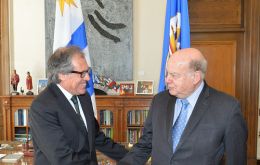
The Secretary General of the Organization of American States (OAS), José Miguel Insulza, met on Wednesday with the only current candidate to succeed him in office, the Minister of Foreign Affairs of Uruguay, Luis Almagro, at the headquarters of the Organization in Washington, DC.
-
Thursday, February 5th 2015 - 03:26 UTC
Uruguay with Pope's blessing to try new approach to human rights and disappeared persons issues

Uruguay will be attempting a new approach to the human rights and disappeared persons issues, a still unfinished legacy from the military dictatorship, (1973/1984) and the decade of armed sedition which preceded the collapse of the country's democracy. The announcement is expected later this month and basically means replacing “truth and justice” for “truth and memory”, following to a certain extent the South African experience.
-
Wednesday, February 4th 2015 - 09:00 UTC
Uruguay with one foot in the Security Council in 2016; has full support from the region
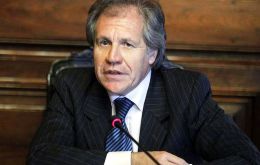
Uruguay is the 'only' candidate from Latin America and the Caribbean and has the necessary votes to be elected next October non permanent member of the United Nations Security Council beginning 2016, announced foreign minister Luis Almagro. This will be the second time a Uruguay seat at the Security Council, the first was in 1965/66.
-
Wednesday, February 4th 2015 - 08:31 UTC
Hereford's best 2014 bull in the world is from Uruguay

The world's best Hereford bull is from Uruguay. “Kamikaze” was chosen king of bulls 2014 by HerefordBreeder.net, the world's top Hereford show which takes place in Texas. The Sunday event was supported in conjunction with the Stock Show and other sponsors, in ceremonies at Fort Worth's West Arena.
-
Monday, February 2nd 2015 - 03:49 UTC
Uruguay's new administration after more open and frank relations with Mercosur
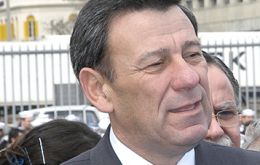
Career diplomats at key embassies, a more frank approach in talks with Mercosur, closer links with Israel and any free trade option with the United States remains frozen, anticipated Rodolfo Nin Novoa, Uruguay's next foreign minister as of next March first when the new administration takes office.
-
Sunday, February 1st 2015 - 20:47 UTC
'Mercosur does not exist': Uruguay should try a one to one deal with the Europe
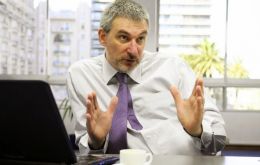
Mercosur does not exist; Uruguay is losing precious time and should try a one to one trade agreement with the European Union, according to Paul Riezler, president of the Euro-Chamber in Uruguay and of the Uruguay-Germany Commerce and Industry Chamber.
